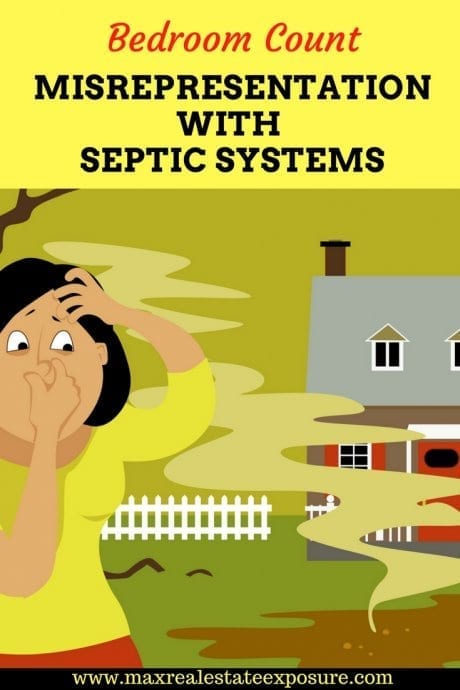 Bedroom count misrepresentation with septic systems happens far more often than you might think. When you go to list your home, you naturally want to list as many bedrooms as you reasonably can—more bedrooms mean a better price for your home, more often than not. But if you have a septic system, you will want to pull on the reins for a minute before you throw up that listing.
Bedroom count misrepresentation with septic systems happens far more often than you might think. When you go to list your home, you naturally want to list as many bedrooms as you reasonably can—more bedrooms mean a better price for your home, more often than not. But if you have a septic system, you will want to pull on the reins for a minute before you throw up that listing.
You can get into some serious trouble if your septic system is not rated for the number of bedrooms you claim, the kind of pain that can include a lawsuit.
The last thing a buyer wants is to be duped by a seller or real estate agent who doesn’t know a simple regulation. More often than not it is the real estate agent who is negligent in not understanding this aspect of the business. Part of a real estate agents job is to educate sellers on what they can and can’t do.
Unfortunately, the real estate agent industry is littered with agents who should be allowed to hold a license, but they do. The barriers to entry are far too low when you are talking about someone’s most considerable investment.
When you don’t take your job seriously and the constant education that goes along with it, you could end up getting sued.
When selling a home, YOU CANNOT market your home as having more bedrooms than your septic capacity regardless of whether they exist or not! So if your home has four actual bedrooms but the septic system capacity is rated for three bedrooms, you have a three bedroom home.
When a Title V inspection is done on a home, the inspector will fill out a Title V inspection report. On page six of the document, there is a section that says “system information.” This is where you will see the number of bedrooms (design) and the number of bedrooms (actual).
The real estate agent marketing a home should be using the number of bedrooms the septic is designed for NOT what is actually there.
How Septic Systems Relate to Bedrooms in a Home
 Septic systems, whether they be big or small, older or newer, all have specific capacities that they are designed for. As a homeowner, notably a home seller, you need to be aware the size of your septic system. By knowing the capacity of your septic system, you can determine how many bedrooms your home is supposed to have.
Septic systems, whether they be big or small, older or newer, all have specific capacities that they are designed for. As a homeowner, notably a home seller, you need to be aware the size of your septic system. By knowing the capacity of your septic system, you can determine how many bedrooms your home is supposed to have.
Septic system capacity is measured, or “rated”, in bedrooms.
At first glance, you might assume that the capacity of a septic system is measured in bathrooms. A bigger septic system should be able to handle more bathrooms, right? Well, not necessarily. In fact, the number of bathrooms is not really a concern.
The issue is the number of bedrooms. Bedrooms indicate how many people may live in the house, and therefore how many people may use the septic system. Each septic system is rated for a certain number of bedrooms.
The design flow of a septic system is based on projected usage based on bedrooms. Systems are designed based on usage of 110 gallons per day per bedroom. The regulation is found in 310 CMR 15.203. So if you have a four bedroom home the septic system would accommodate 440 gallons of water a day.
You cannot have more bedrooms than the septic system can handle.
When it comes to real estate listings, you cannot market for more bedrooms in the home than the septic system is rated for. Now the reality of the situation may be different—you could very well have more bedrooms in the house than the system is calculated for.
BUT you cannot list and try to sell the home to a buyer stating that the house has more bedrooms than the septic system bedroom capacity. If the buyer finds out that the system is not rated for the number of bedrooms in the home, there is a genuine risk of a lawsuit.
Listing a home with more bedrooms than the septic system is rated for is illegal in Massachusetts.
Every state has its laws regarding real estate, so it is important to verify what you can and cannot do legally in your specific state. In Massachusetts, attempting to sell your home by listing more bedrooms than the septic system is rated for is illegal.
Yet Realtors and home sellers still wind up trying to sell homes this way in the state, most likely because they are unaware of the laws regarding septic system ratings and home sales.
What is Considered a Bedroom Anyway?
Septic systems are one way to determine bedroom count but do you know the actual definition of a bedroom? Defining a bedroom has some grey area for sure. Generally speaking for a room to be considered a bedroom it needs to meet the following criteria:
- Have a minimum size – the square footage of the room usually needs to be at least 70-80 square feet.
- Must have a means of egress – typically you need a way in and a way out including a door and window large enough to escape through. For additional guidance, the International Residential Code suggests the window must have a minimum opening area of 5.7 square feet, a minimum opening height of twenty-four inches, and a minimum opening width of twenty inches. The furthest distance between the finished floor and a finished window sill can be 44 inches.
- Minimum height – typically at least seven feet some a person can walk comfortably in the room.
- You might need a closet – depending on local building codes you may need a closet. This is less clear-cut than most believe. Many people mistakenly think you always need a closet.
Beyond septic system criteria, you should also never call a room a bedroom that does not meet the above requirements.
How Do Sellers Wind Up Breaking the Law?
 The vast majority of home sellers and most Realtors are not setting out to break the law when they claim more bedrooms than the septic system is rated for. They just want to get as much money out of the property as possible.
The vast majority of home sellers and most Realtors are not setting out to break the law when they claim more bedrooms than the septic system is rated for. They just want to get as much money out of the property as possible.
Some of the common reasons why misrepresentations happen include:
Additions to the home
When homeowners add on to their property, they are not always thinking about the septic system. They want to increase the square footage of the house, either for practical reasons (a growing family), to improve resale value or both.
When the addition is considered, it is common to miss the implications of what will happen concerning the septic system.
A growing number of homeowners have also skipped out on getting the required building permits for doing work at their homes. The town therefore often has no idea that the owners have improved their property by adding rooms.
Doing so is not only skirting the law, but payback can be a real bitch when it comes time to sell. Sellers will be asked on a disclosure form whether or not they have done any work on their home that required a permit.
A significant percentage of buyers will either not want to purchase a home where sellers have not gotten appropriate permits, or they will ask sellers to complete them.
Some towns are cracking down on folks who don’t pull permits. While many towns will let an owner go through the permitting procedure, other communities are now making owners rip out all their non-permitted work.
Recently, I was told Grafton Massachusetts had asked owners to completely remove an entire finished basement built without permits. Folks it is not worth it!
While you may save some money screwing the town out of tax dollars for a more substantial home, that eventually may bite you in the ass.
Basement or attic conversions
Basements and sometimes attics offer enticing possibilities for adding more livable space to the home. They may not be as comfortable or ideal as the original living areas in the home, but they can certainly be made of a high enough quality to be enjoyable and useful. Of course, finishing a basement or attic does nothing to increase the capacity of the septic system.
Over the years selling homes in and around Metrowest Massachusetts people finishing additional areas of the home has been a significant contributing factor to misrepresenting bedroom counts.
In fact, one of the more common blunders is when someone finishes a basement with an in-law apartment and then proceeds to include it in the bedroom count. Doing so is blatant bedroom misrepresentation.
Turning small rooms into bedrooms.
If a room has a closet, a door and a window big enough to escape through, it is usually possible to call it a bedroom. However, a quick bedroom conversion like this does not account for the septic system rating. What seemed like a great, simple idea for adding value to the home can quickly become problematic.
Real Estate agents and home sellers get sued all the time - Don't be one of them!Click To TweetHow to Determine the Septic System Rating
 You may have documents available that show you what your septic system rating is. If you do, make sure to reference them before you decide on what you will put in your listing. If you do not have such documents, you can request that your Realtor verify the information at your local town hall.
You may have documents available that show you what your septic system rating is. If you do, make sure to reference them before you decide on what you will put in your listing. If you do not have such documents, you can request that your Realtor verify the information at your local town hall.
Most board of health agencies will have the information, either classified as a septic system design or “septic as built.”
In Massachusetts there is another way that the rating of septic systems is determined, known as a Title V. As previously mentioned, a Title V is a test that is performed when a home is transferred from an owner to someone other than a family member.
As part of the inspection, the septic system company will create a Title V report that indicates the capacity of the septic system.
Room Counts Also Determine Septic System Capacity
One of the lesser parts of the Title V law that fewer people know about is how room counts determine septic system capacity. The formula for septic capacity with room counts is dividing the number of rooms by two to get the appropriate size the system should be designed for.
For example, if there are ten actual rooms in the home, the home should be designed for five bedrooms. Ten rooms divided by two equals five bedrooms. There is, however, some funky ways around what is considered a room.
When there are back to back rooms with an opening between equal or greater than eight feet, this is considered one room. So if you have a dining and living room where there is a cased opening eight feet or maybe just separated by decorative columns, this is only considered one room.
Years ago it seemed as if this part of the law was never enforced but now it being enforced by more communities.
What About a Deed Restriction?
Some Massachusetts communities have allowed homeowners to put a deed restriction on for their property rather than asking them to upgrade their septic system. The deed restriction essentially says that the homeowner agrees they will only market their home for the bedroom count determined by the septic system.
The deed restriction passes with the house so the next owner will also have to comply with this as well.
Some towns will allow a deed restriction so that a building permit may be issued for homes that exceed the approved septic design flow based on the total room count. The deed restriction intends to resolve the possible conflicting Title 5 definition of a bedroom to the actual amount of bedrooms in the home.
For example, you might currently have a nine-room home and are looking to add a “game room” to your property. By adding the tenth room you technically need a five bedroom septic system. The deed restriction is a compromise.
In the future, if public sewer becomes available or the septic system is upgraded the deed restriction could be released.
Do Not Expect Your Realtor to Know This!
 It is an unfortunate reality that numerous Realtors are unaware of the legal implications of listing a home with more bedrooms than the septic system is rated for. Time and again listings are put up that indicate a house has a certain number of bedrooms—more bedrooms than the septic system can handle.
It is an unfortunate reality that numerous Realtors are unaware of the legal implications of listing a home with more bedrooms than the septic system is rated for. Time and again listings are put up that indicate a house has a certain number of bedrooms—more bedrooms than the septic system can handle.
Now, it is possible that the mistake will go unnoticed, but it is just as likely that the error will be called out and repercussions will follow.
As a homeowner, you like to think that you can trust your Realtor to protect you from situations like this. But just as some Realtors use shoddy pictures, fail to market a home beyond the MLS and lack negotiation skills, some real estate agents are also unaware of the laws that they should know.
I can’t tell you the number of times people have read articles I have written about bedroom counts and septic systems. Usually, it is after they have been sold a bag of goods by a real estate agent who misrepresented the correct amount of bedrooms.
One More Word of Advice on Title V Inspections
What many buyers, their real estate agents, and even lenders don’t realize is that the Title V report that everyone relies on might not be approved. It is a general practice and assumption that the Title V report passed around is approved. It is not!
The Title V inspector has up to thirty days to submit the report to the local board of health or DEP from the time of the inspection. It is indeed possible that these entities could not approve some part of the inspection. Yes – you are reading this correctly!
You could close on your home and later find out your Title V is not approved!
Final Thoughts
Septic system laws can vary from state to state. It is essential to make sure you understand local laws and customs when buying and selling a home serviced by a septic system. Be sure to do your due diligence, or it could cost you later down the road.
Understanding disclosure laws is always vital when selling a home.
Additional Home Selling Articles Worth a Look
- Who does your real estate agent represent via Paul Sian.
- Important repairs when selling via Anita Clark.
- The keys to getting your home sold via Karen Highland.
- Don’t be a home that comes back on the market via Michelle Gibson.
- Real Estate gone bad by misrepresentation via Kevin Vitali.
Use these additional articles to further educate yourself on what it takes to be a successful home seller.
About the author: The above Real Estate information on bedroom count misrepresentation with septic systems was provided by Bill Gassett, a Nationally recognized leader in his field. Bill can be reached via email at billgassett@remaxexec.com or by phone at 508-625-0191. Bill has helped people move in and out of many Metrowest towns for the last 31+ Years.
Are you thinking of selling your home? I have a passion for Real Estate and love to share my marketing expertise!
I service Real Estate sales in the following Metrowest MA towns: Ashland, Bellingham, Douglas, Framingham, Franklin, Grafton, Holliston, Hopkinton, Hopedale, Medway, Mendon, Milford, Millbury, Millville, Northborough, Northbridge, Shrewsbury, Southborough, Sutton, Wayland, Westborough, Whitinsville, Worcester, Upton and Uxbridge MA.
Great advice. Septic systems are a common issue in the real estate litigation we handle. While septic systems are not unusual in many parts of Southern Maryland many people moving to the area are not. Puffing up a listing or trying to play it cute on disclosures is a great way to invite a lawsuit from the buyer. Trying to get that little extra money out of a sale could buy you years of litigation tens of thousands of dollars in attorney’s fees. But just think how well you could get to know your lawyer during the cases.
Totally agree Dave. Here is see a lot of agents who don’t do their due diligence. They rush to get the home listed for sale without doing their homework. A recipe for disaster!